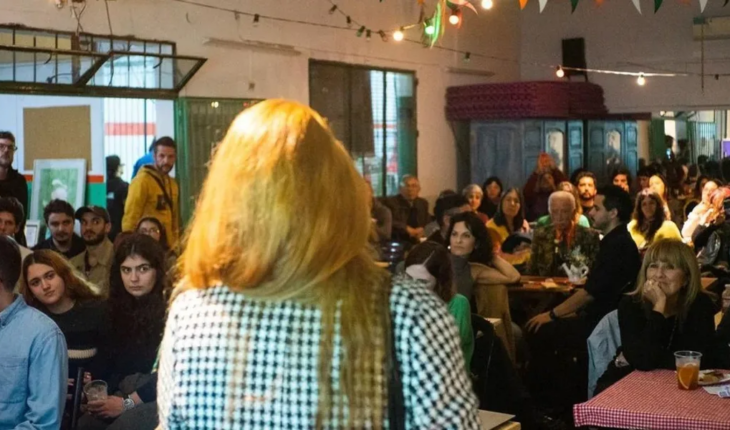* Note written by Micaela Robles and Antonella Morello.On Avenida Paseo Colón at 600, a café-restaurant preserves the Buenos Aires idiosyncrasy that exalts it as a powerhouse of creation and art. For more than 80 years in a room that used to function as a general store, between cups and chairs, intellectuals discussed their stories and novels, shared readings, danced milonga and tango, and today? It is Saturday, April 15 after 5 pm. Something of that history is breathed among the guests at the first Gray Film Festival in the world, an idea of the communicator Paz Varales, director of Cinéfilos, who together with the Bar de Viejes initiative recover the preservation and enjoyment of these spaces so that nothing ever dies: nor who we will be, are or were; nor the cinema.” I contacted Martina (who also celebrated her birthday between her opening speech), who manages very well this project that focuses on giving life to these historic bars that are in need of a lot of support and dissemination. I said, “Do you like this idea of doing a festival?” says Paz in a dialogue with Filo.news.Martina, María Álvarez and Paz at the Festival de Canas | Photo, credits: Ana Tonso.“We did it together and here we are. We put together from Cinéfilos with Bar de Viejes and put together a program: many ladies, we invite Buenos Aires characters because not only actors, directors and famous people, but it is a very Buenos Aires festival for us to celebrate the grandparents who are here, the stories that are here in Buenos Aires, where you meet an ironmonger, An owner of an American fair, a tailor, people who are wonderful and who are very important to me, who make this city magical. We made short films about them, and they’re all having their minute of fame. I think it’s beautiful,” he adds. At the dawn of cinema: the paradox of a young festival dedicated to the course of time
The Festival de Canas is the ancestry of the Festival de Canes, the first of this cinephile sequel that combined dogs and audiovisual productions, where as Paz says, “there are no antis or haters for now”, in reference to old age and furry. Both were born consecutively, and each at a festival.” The idea arose in Mar del Plata, when the Festival de canes was in production, “says its director, two months after in Jujuy, at the Las Alturas Film Festival, the move was born to take the Cannes event (which is less than a month away from its 76th edition) and remove an “N” to resignify its value and theme.Canas Film Festival | Photo: Micaela Robles.“Mar del Plata for me is a very unfathomable festival, very difficult to cover because there are millions of films. In the midst of all those premieres, I met Elena at the opening party. A lady who has been going for 50 years and who did not miss any edition. There we said ‘the coverage is this: her experience, what she transmits to her, why at 92 years old she keeps coming'”, Paz discovered.Playing but at the same time craniing, together with a friend they captured him drawing on a napkin. “We finished the Canes, we said why not the gray hair?, I saw a couple of pending movies and we defined the programming,” he proposed. The call brought together an age-diverse audience, which in turn contrasted the stereotypes associated with youth and old age: what exactly ages us and how much does it rejuvenate us? How do ages coexist?Filo.news present at the Canas festival, with Paz Varales and tailor Jorge Williams | Photo, credits: Ana Tonso.“I think there is something of ‘it is going to come to us’, in a few years we are going to be them, we are going to narrow the generation gap. There are ladies who need a plan to make a Saturday with friends. It was part of the objective to mix many young people in the call,” says Paz. The Cinéphilas” and the eternal magic of cinemaCinema as a tool of transcendence. As an encounter of multiple solitudes. Like an immovable slope of routine. This is how the retired women who show “Las cinéphilas” (2017), the film by María Álvarez that was shown on the afternoon of the first day of the Festival de Canas.From Spain, Argentina and Uruguay, the director portrayed what it means for them to go to the cinema every day, their curiosity to know new stories and open new worlds. It is a sensitive and intimate film that is part of a trilogy aimed at art and old age that was awarded and recognized in several festivals: “El tiempo perdido” (2020) -which focuses on reading- and “Las cercas” (2021) -dedicated to music-. Álvarez represents everyday characters – which inspired the idea of the festival – in the testimonies of ladies who go to the cinema not to wait, and who as the sea, with which some are in La Bristol is an existential experience, something that happens at that moment. Neither before nor after.“Las cinéphilas”, by María Álvarez.They evoke their memories, their collections, they look, they evoke fragments of the films they saw, the locations where they were filmed, they tell what they are and do not want to be, and they quote. Like the fragment of Marcel Proust that manifests: in the face of the advance of time, memory is the only thing that remains fixed for each person. After the screening of the film, the director answered questions and answers from the viewers, as a preview of the talk of the collective “The revolution of the old”, a movement that thinks about old age from a feminist and human rights perspective, and Carolina Anabella Iglesias, creator of the “Senes Personas Mayores” project that fights against discrimination against the elderly. Canas Film Festival | Photo: Micaela Robles.On Sunday, the appointment was at the Club Saber (Llerena 2727, Parque Chas) where it was the turn of the film “Foto Estudio Luisita” by Sol Miraglia and Hugo Manso, which tells the story of the photographer Luisita Escarria, who portrayed figures such as Tita Merello and Susana Giménez, Amelita Vargas a Olmedo, Porcel and Atahualpa Yupanqui. Perfect attendance for cinephile passion: “From there I did not stop going””I am Mrs. Elena Basez, I will be 92 years old in a month and I am very well”; with those words Elena introduces herself to Filo.news during the first day of the Festival de Canas, or as she called it, “these beautiful festivals that are made about cinema”. And if there’s one thing he knows, it’s that: he’s had perfect attendance at the Mar del Plata International Film Festival since 1954.” I never imagined that I would have this reaction from people, young girls, students, they have behaved very well with me, “he thanked when remembering his passage through the last meeting in “La feliz”. How was your love for cinema born? Why dive every day among new stories?” I went to a school for nuns, and every Sunday there was a cinema for the children. My mom would take me and then they would pick me up. From there I liked the cinema, I did not stop going”, recalls Elena and continues: “I stopped when my husband died, four years that I did not go almost anywhere, but then yes, I toured Europe, Russia, many beautiful places, I am very happy “; in fact, accompanied by her granddaughter, she saw the film “Las Cinéphilas” that was screened on the first day of the Festival de Canas. “It’s very good, it explains pretty well what the years are,” he said.Elena with Jorge, present at the Festival de Canas | Photo: Micaela Robles.After all, cinema is that space of encounter and passion that is strengthened over time: “It is a learning, it is a learning to talk, to see how people behave, when you grow up you see things that you never imagined, and so it grew all your life with the cinema”.
Cinema and old age: how the first Gray Hair Festival in the world was experienced
April 20, 2023 |





